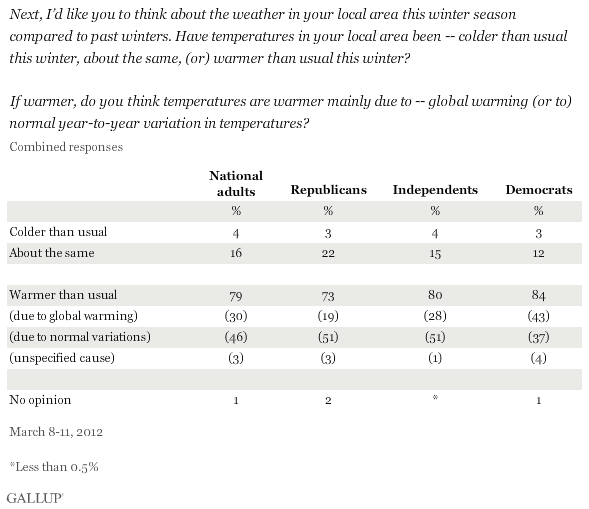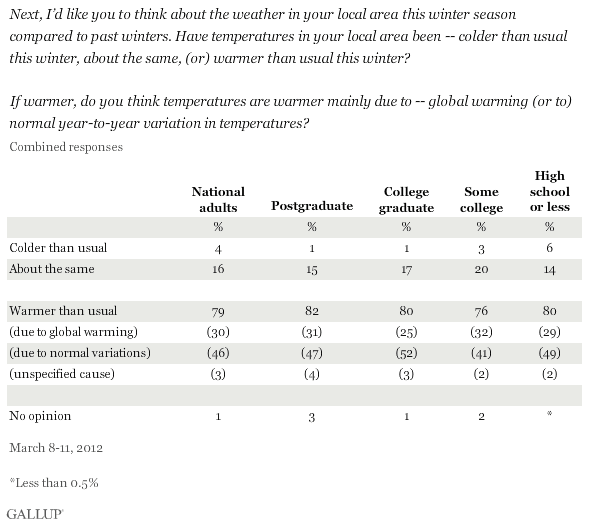PRINCETON, NJ -- Most Americans agree that this winter has been warmer than usual in their local area, but don't agree on the cause. Republicans and independents are more likely to say the warmer temperatures are due to normal year-to-year temperature variations, while Democrats are more likely to say the cause is global warming.

Overall, 79% of all Americans agree that it was warmer than usual in their local area this winter, with clear variation by region. More than nine in 10 of those living in the East (92%) and Midwest (95%) say this winter was warmer than usual, compared with 77% in the South and 55% in the West.
Republicans are less likely than Democrats and independents to live in the East, and slightly more likely to live in the South, which may partially explain why Republicans are less likely than either independents or Democrats to have perceived a warmer-than-usual winter.
Americans who say it has been warmer than usual in their local area were asked whether they think this is due to global warming or to "normal year-to-year variation in temperatures." Overall, Americans tilt toward the latter explanation; 46% say the winter was warmer than usual due to normal temperature fluctuations, compared with 30% who attribute it to global warming.
However, these views are strongly related to political orientation. Specifically, 51% of both Republicans and independents say it has been warmer than usual due to normal temperature variations, while 19% and 28% of the two groups, respectively, say it was warmer due to global warming.
Democrats, on the other hand, are more likely to say the warmer-than-usual temperatures have been due to global warming rather than to normal temperature fluctuations, by 43% to 37%.
Americans of all educational and age groups are more likely to believe the warmer temperatures were caused by normal temperature variations rather than by global warming.

Implications
It is fair to say that most Americans do not have the scientific background or available resources to make an accurate assessment of the cause of what they perceive to be this winter's warmer-than-usual temperatures. Thus, Americans, when asked to speculate on the cause of the warmer temperatures, must rely on what they have read, heard, or seen. The types of discussions Americans read, see, or hear on this issue, in turn, are clearly related to their political orientations.
Gallup has previously documented a decline in Americans' concern about the seriousness of global warming, driven by greater skepticism among conservatives and Republicans. This conforms with skepticism among the conservative news media about the impact of human activities on global warming and controversies about global warming research in general.
The current findings confirm that politics do play a role in views about climate change. The majority of Democrats who believe that temperatures were warmer than usual this winter ascribe this phenomenon to global warming, while even higher majorities of Republicans and independents ascribe it to normal temperature fluctuations.
Survey Methods
Results for this Gallup poll are based on telephone interviews conducted March 8-11, 2012, with a random sample of 1,024 adults, aged 18 and older, living in all 50 U.S. states and the District of Columbia.
For results based on the total sample of national adults, one can say with 95% confidence that the maximum margin of sampling error is ±4 percentage points.
Interviews are conducted with respondents on landline telephones and cellular phones, with interviews conducted in Spanish for respondents who are primarily Spanish-speaking. Each sample includes a minimum quota of 400 cell phone respondents and 600 landline respondents per 1,000 national adults, with additional minimum quotas among landline respondents by region. Landline telephone numbers are chosen at random among listed telephone numbers. Cell phone numbers are selected using random-digit-dial methods. Landline respondents are chosen at random within each household on the basis of which member had the most recent birthday.
Samples are weighted by gender, age, race, Hispanic ethnicity, education, region, adults in the household, and phone status (cell phone only/landline only/both, cell phone mostly, and having an unlisted landline number). Demographic weighting targets are based on the March 2011 Current Population Survey figures for the aged 18 and older non-institutionalized population living in U.S. telephone households. All reported margins of sampling error include the computed design effects for weighting and sample design.
In addition to sampling error, question wording and practical difficulties in conducting surveys can introduce error or bias into the findings of public opinion polls.
View methodology, full question results, and trend data.
For more details on Gallup's polling methodology, visit www.gallup.com.
